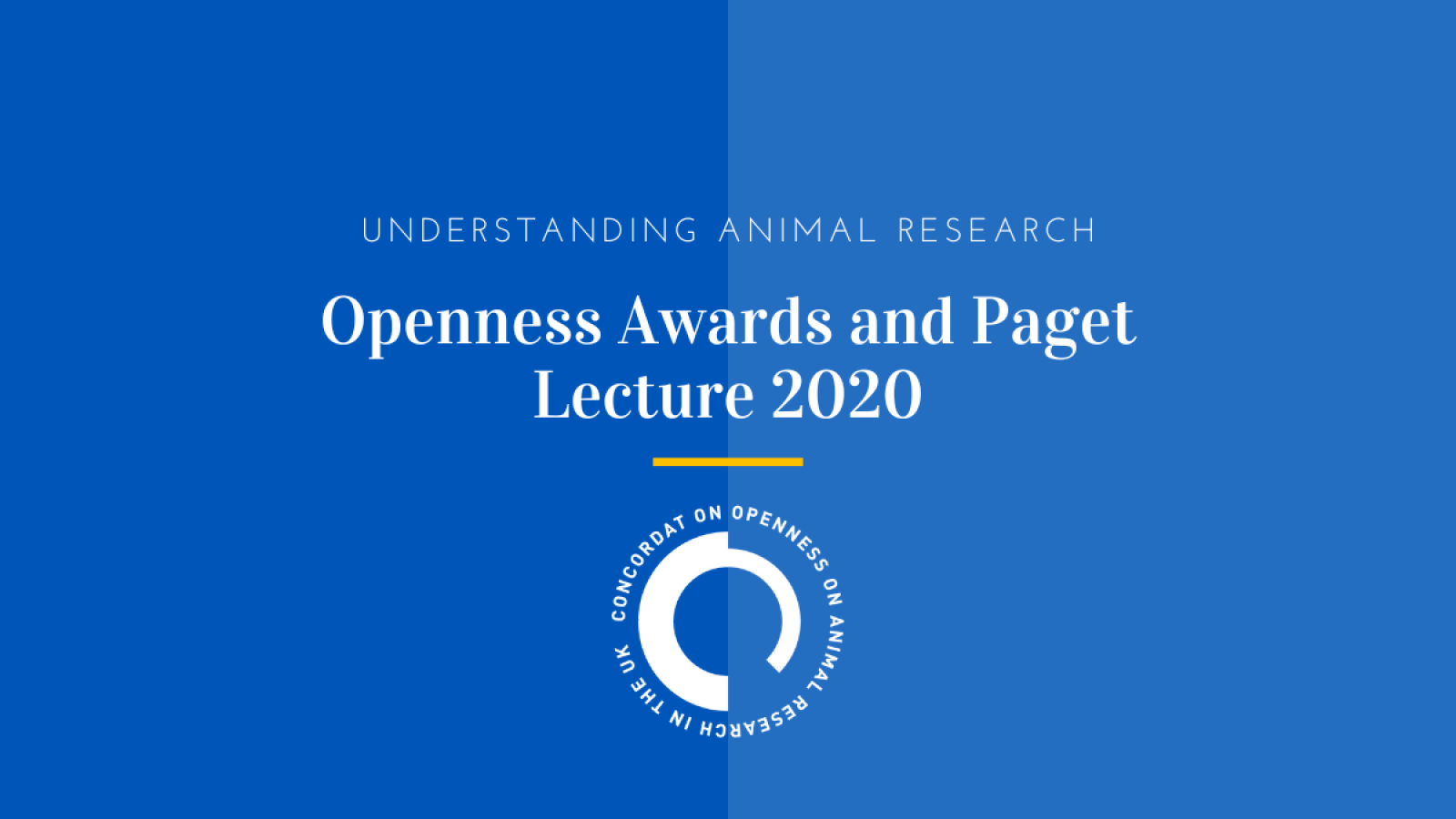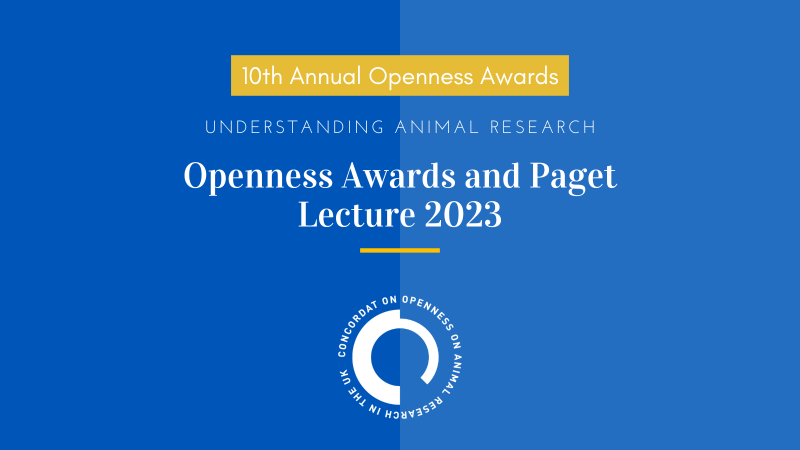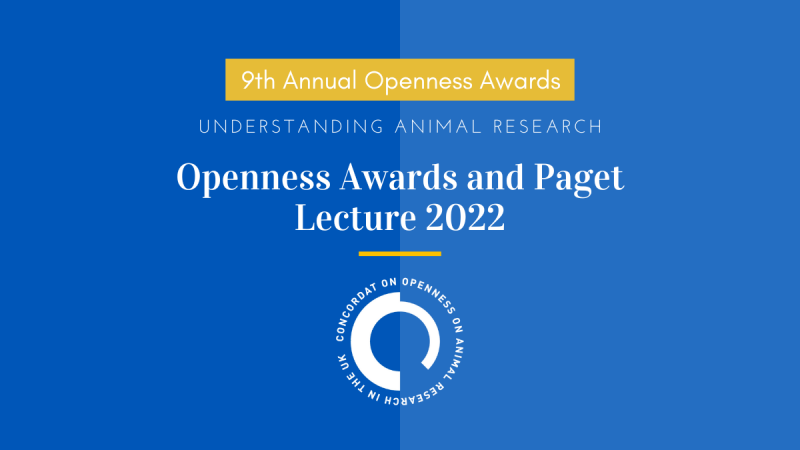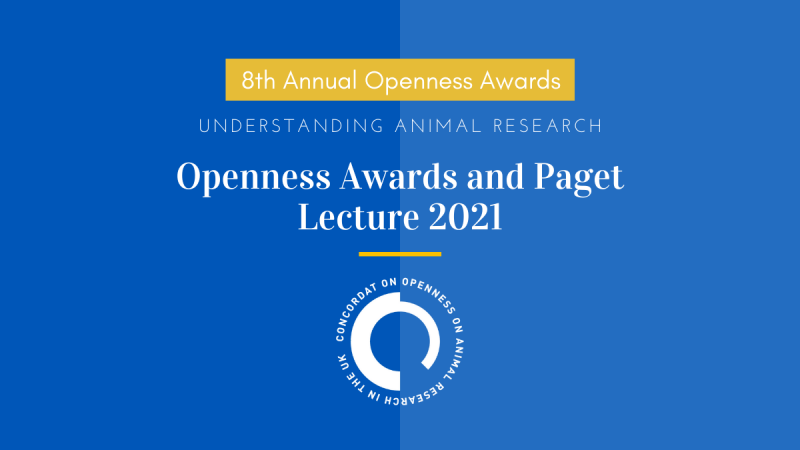
UAR Openness Awards 2020
On Monday 7 December 2020 Understanding Animal Research hosted the 7th Annual Openness Awards. Due to the Covid-19 pandemic, the ceremony was carried out virtually and the 84th Stephen Paget Memorial Lecture was postponed until 2021.
Concordat on Openness Annual Report 2020
Professor Jeremy Pearson, Chair of UAR’s Council, welcomed the publication of the 6th Annual Concordat on Openness Report. This May we celebrated six years since the launch of the Concordat, and the publication of this year’s report shows that the majority of signatories continue to engage proactively with the media and general public. Engagement with schools and local communities remains high, and there continues to be opportunities for journalists, members of the public, and non-research staff to step inside animal facilities.
Online communications have become even more important this year and the report highlights the widespread use of social media and dedicated animal research websites to engage digitally. The use of video and online lab tours to illustrate facilities and research has grown, and more signatories than ever are sharing their animal use statistics and providing detailed information on the severity and harms experienced by their animals.
Leaders in Openness 2020 – 2023
Jeremy also announced that the University of Edinburgh had become a Leader in Openness. Leaders in Openness allows us to recognise the signatories that are consistently achieving and embedding good practice. This standard isn’t appropriate to all Concordat signatories, but those that are successful have shown that they have met good practice criteria. The University of Edinburgh joins the list of 13 Leaders in Openness announced last year.
Openness Awards 2020
The Openness Awards represent excellence and innovation in communications around the use of animals in research, and the winners are organisations that are pushing the boundaries of openness and leading by example.
University of Reading
The first award of the evening was presented by Nic Wells, Professor in Translational Medicine at the Royal Veterinary College, to the University of Reading.
Earlier in the year, the University of Reading launched a media campaign to highlight work with their llamas, which is aiding the global search for vaccines and treatments for COVID-19. The campaign was designed to support communications from Universities UK on how universities are aiding the response to the coronavirus and reach beyond the usual science or medical-story audience.
The campaign included pictures and details of the llamas, explained the nature of procedures undertaken and why animals are important to coronavirus research. The story was shared across social media and received excellent coverage in traditional media.
The Openness Awards judging committee felt that the university’s communications team showed an excellent grasp of news, creating a compelling piece that will help many people to better understand the use of animals in research. Their approach is bold, courageous and relevant, and they are willing to be questioned about their research; harnessing social media effectively at a time when people are curious and engaging extensively online.
The University of Edinburgh's Roslin Institute
The second award was presented by Matt Guille, Professor of Developmental Genetics at the University of Portsmouth, to the University of Edinburgh’s Roslin Institute.
In 2019 the Roslin Institute developed a teachers’ toolkit to raise awareness about the use of animals in research and the role of animal care staff in providing good welfare.
The free toolkit, which is linked to the Scottish curriculum, was designed for teachers with pupils aged 9-14 years old to download and use in the classroom. It supports classes to explore the scientific method using a series of simple, pupil-guided experiments with earthworms.
The toolkit highlights the importance of studying animal behaviour, introduces the 3Rs and gives teachers and pupils practical experience of designing their own investigation using earthworms. Additional support for teachers is delivered via CPD sessions and the toolkit has been downloaded for use with young people across the world, including Europe, Africa, South America and North America. Although the use of unprotected animals in classroom demonstrations should not be taken lightly, this toolkit encouraged sensitivity in working with living animals to study behaviour. In response to the COVID-19 pandemic, the institution adapted the toolkit for use by families at home.
The Openness Awards judging committee felt that this was an innovative and exciting piece of schools’ engagement, which will encourage young people to think differently about animal behaviour and how we understand it.
University of Southampton
The third award was presented by Dr Sarah Bailey, Senior Lecturer in the Department of Pharmacy and Pharmacology at the University of Bath, to the University of Southampton.
The University of Southampton has created a curiosity-driven crafting activity (The Mouse Exchange) to help members of the public think deeply about the complexities of creating and caring for research animals. The activity is led by researchers and was designed to be highly accessible to encourage diverse participation, by adults and children from a range of backgrounds.
Those taking part in the activity joined small groups and used felt and other craft materials to make a mouse over 20 minutes. During this activity, questions and experiences were exchanged between participants and researchers, introducing complex ideas around care, institutionalisation, scientific process and uncertainty.
Topics discussed were participant-led and including personalised medicine, colony management, animal transport, animal sentience and public perceptions, breeding, housing, rehoming, caring, professional roles, and legislation. At its core this project uses a simple creative activity to draw attention to more complex ideas about the relationships between people and laboratory animals.
The workshop, which was launched in 2018, has featured at numerous science festivals, adult events, teaching seminars, and international conferences. It is currently being used in engage members of the public with social science research findings on the supply chains of mice. During 2020 a virtual workshop was developed, allowing the team to work in a COVID-safe way, while reaching a wide range of participants. The team hopes to offer the toolkit it has developed, for stakeholders to use in their own engagement practices in the future.
The research sector seeks engagement that brings diversity, inclusiveness and the ‘lay-critique’ which asks a fundamental and obvious question that everyone else overlooked. The only way to achieve these is to invite complex conversations with true non-specialists, and that is a difficult task.
Initial concerns among judges about trivializing animal research were balanced by the innovative approach of this project, which gives the public a window into some of the more conceptually difficult discussions around laboratory animal welfare.
NC3Rs and Mary Lyon Centre, MRC Harwell Institute
The fourth and final award of the evening was presented by Dr Gill Fleetwood, cardiovascular pharmacologist and member of UAR’s council, to the NC3Rs and Mary Lyon Centre, MRC Harwell Institute.
These two institutes have worked together, creating Rodent Little Brother: Secret Lives of Mice, a citizen science project hosted by Zooniverse, to generate scientifically useful data, while opening a dialogue with members of the public about the need for animals in research, and the nature of the work done with animals. Their project is the first time a citizen science approach has been used in laboratory animal science.
In this project, members of the public watch six-second video clips of mice in the Home Cage Analyser system, identifying and recording the activity they observe. The cage system allows mice to be studied in their home cage environment, minimising any stress associated with moving animals to test areas. The system produces a huge amount of video data capturing mouse behaviour and must be annotated to train algorithms and enable automatic computer recognition of key mouse behaviours, such as climbing, eating and drinking.
More than 4,000 volunteers registered to participate in this project, between them logging 211,000 behavioural events since its launch in August 2019.
Participants also receive detailed information on why mice are used in medical research, the 3Rs impact of the project and the importance of developing a better understanding of mouse behaviour.
The judging committee commended the reach and innovation of the project, which engaged many members of the lay public in rodent welfare research, supporting both openness and the humane use of animals in research. This is a huge piece of work which has involved a great many people in animal research, allowing them to see the realities of research for themselves.
Many thanks to all our presenters and a huge congratulations to all the Openness Award winning institutions.
Last edited: 5 September 2023 15:00






